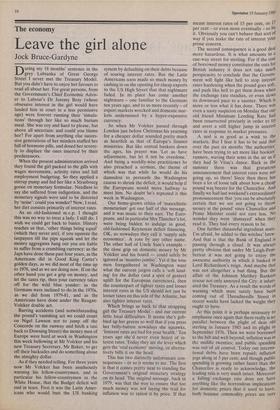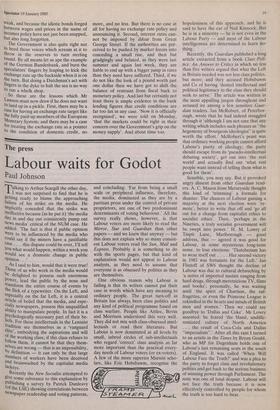The economy
Leave the girl alone
Jock Bruce-Gardyne
During my 18 months' sentence in the grey Lubianka of Great George Street I never met the Treasury Model. But you didn't have to enjoy her favours to read all about her. For great persons, from the Government's Chief Economic Advis- er to Labour's Dr Jeremy Bray (whose obsessive interest in the girl would have landed him in court in a less permissive age) were forever running their 'simula- tions' through her like so much barium meal. She was coy and hard to please, but above all uncertain: and could you blame her? For apart from anything else succes- sive generations of her minders stuffed her full of hormone pills, and dosed her severe- ly to displace the ones inserted by their predecessors.
When the present administration arrived they found the girl packed to the gills with wages movements, activity rates and full employment budgeting. So they applied a stirrup pump and fed her like a Strasbourg goose on monetary formulae. Needless to say she suffered from indigestion, and the monetary signals were said to be distorted by 'noise': could you wonder? Now, I read, her diet consists primarily of interest rates.
As an old-fashioned m.c.p. I thought this was no way to treat a lady. I still do. I wish we could get back to basics. History teaches us that, 'other things being equal' (which they never are), if you squeeze the taxpayers till the pips squeak and let the money aggregates hang out you are liable to suffer from a crumbling currency: as the Japs have done these past four years, as the Americans did in Good King Carter's golden days, as we did most of the time up to 1976, and as we are doing now. If on the other hand you get a grip on money, and let the taxes rip, then your currency takes off for the wild blue yonder: as the Germans were inclined to do in the 1970s, as we did from 1979-81, and as the Americans have done under the Reagan- Volcker double act.
Barring accidents (and notwithstanding the pound's vanishing act we could count on Nigel Lawson not to jump off the Concorde on the runway and hitch a taxi back to Downing Street) the money men of Europe were hard at work in Washington this week bellowing at Mr Volcker and his new Treasury Secretary, Mr Baker, to get off their backsides and do something about the almighty dollar.
As if they needed telling. For three years now Mr Volcker has been assiduously warning his fellow-countrymen, and in particular his fellow-countrymen in the White House, that the Budget deficit will end in tears. First it was the Latin Amer- icans who would bust the US banking system by defaulting on their debts because of soaring interest rates. But the Latin Americans soon made so much money by cashing in on the opening for cheap exports to the US High Street that that nightmare faded. In its place has come another nightmare - one familiar to the Germans ten years ago, and to us more recently - of export markets wrecked and domestic mar- kets undermined by a hyper-expensive currency.
So when Mr Volcker passed through London just before Christmas his yearning for a cheaper dollar sounded pretty much as heartfelt as that of Europe's finance ministries. But like central bankers down the ages, his prayer was 'Let us have adjustment, but let it not be overdone.' And being a worldly-wise practitioner he also preached a sermon, the theme of which was that while he would do his damndest to persuade the Washington caucus to shrink the deficit, it would help if the Europeans would move halfway to meet him. No doubt he's repeated it this week in Washington.
Our home-grown critics of 'masochistic monetarism' got one half of this message, and it was music to their ears. The Euro- peans, and in particular Mrs Thatcher's lot, were being bidden to indulge in good, old-fashioned Keynesian deficit financing. OK, so nowadays they call it 'supply side economics'. A rose by any other name. The other half of Uncle Sam's example the close grip on domestic money by Mr Volcker and his board — could safely be ignored as 'mumbo-jumbo'. Yet if the wise men foregathered in Washington want what the current jargon calls a 'soft land- ing' for the dollar (and a spot of genteel uplift for the European currencies), then the counterpart of tighter taxes and looser interest rates in the US should not just be looser taxes on this side of the Atlantic, but also tighter interest rates.
Which brings us back to that strapping girl the Treasury Model - and our current little local difficulties. It seems she's gob- bled up her greens so well that if you press her belly-button nowadays she squawks, 'Interest rates are bad for your health.' Ten years ago she'd never even heard of in- terest rates. Today they are the lever which gets the 'real economy' moving, or alterna- tively biffs it on the head.
This has two distinctly unfortunate con- sequences - or so it seems to me. The first is that it comes pretty near to standing the Government's original monetary strategy on its head. The original message, back in 1979, was that the way to ensure that too much money was not laying the trail for inflation was to ration it by price. If that
meant interest rates of 15 per cent, or 17 per cent - or even more eventually - so be
it. Obviously you can't behave that sort of way if you make the rate of interest your prime concern. The second consequence is a good deal more hazardous. It is what amounts to a one-way street for sterling. For if the cost of borrowed money constitutes the oats for British industry it does not take much
perspicacity to conclude that the Govern-
ment will fight like hell to stop interest rates hardening when the pound goes soft, and push like hell to get them down when the exchange rate steadies, or even slows its downward pace to a saunter. Which is more or less what it has done. There was even a nasty suspicion on Monday that our old friend Minimum Lending Rate had been resurrected precisely in order to try and avert a still higher jump in interest rates in response to market pressures.
A nod is as good as a wink to the markets. But I fear it has to be said that, over the past six months 'the authorities, have been trying to act more like bookies' runners, waving their arms in the air as if they had St Vitus's dance. Back in the summer there was that gratuitous announcement that interest rates were not going up, so there! Since then there has been a lot of loose talk about how a cheap pound was beezer for the Chancellor. And finally we had last weekend's extraordinary pronouncement that 'you can be absolutely certain that we are not going to throw money at the pound' since Chancellor and Prime Minister could not care less. No wonder they were 'dismayed' when they read it. They had every reason to be. One further distasteful ingredient must, I'm afraid, be added to this witches' brew. And that is that the Bank of England is passing through a cloud. It was always pretty obvious that under Mr Leigh-Pem- berton it was not going to enjoy the awesome authority in which it basked in Lord Richardson's reign. And maybe that was not altogether a bad thing. But the affair of the Johnson Matthey Bankers rescue not only annoyed the City: it infuri- ated the Treasury. As a result the words of warning which must surely have been coming out of Threadneedle Street in recent weeks have lacked the weight they ought to have.
At this point it is perhaps necessary to emphasise once again that there really is no parallel between the plight of dear old sterling in January 1985 and its plight in September 1976. Then we were borrowed to the hilt and well beyond; inflation was in the middle twenties; and public spending was out of all control. Today our interna- tional debts have been repaid; inflation jogs along at 5 per cent; and though public spending is growing rather faster than the Chancellor is ready to acknowledge, the leading rein is very much intact. Moreover a falling exchange rate does not have anything like the horrendous implications for domestic prices that it used to have, both because commodity prices are very Weak, and because the idiotic bonds forged between wages and prices in the name of incomes policy have not just been snapped, but also long forgotten. The Government is also quite right not to heed those voices which scream at it to throw in the reserves to turn sterling round. By all means let us ape the example of the German Bundesbank, and burn the speculators' fingers by leaping to kick the exchange rate up the backside when it is on the turn. But doing a Dutchman's act with fingers in the dyke to halt the sea is no way to run a whelk shop. So these are the lessons which Mr Lawson must now draw if he does not want to land up in a pickle. First, there may be a case for having an exchange rate target like the fully paid-up members of the European Monetary System; and there may be a case for treating the exchange rate as a pointer to the condition of domestic credit, no more, and no less. But there is no case at all for having no exchange rate policy and announcing it. Second, interest rates can- not be imposed by diktat from Great George Street. If the authorities are per- ceived to be pushed by market forces into conceding a small rise, and then but grudgingly and belated, as they were last summer and again last week, they are liable to end up with a bigger jump in rates than they need have suffered. Third, if we do not like the look of a pound worth just one dollar then we have got to shift the balance of restraint from fiscal back to monetary policy. And last but certainly not least there is ample evidence in the bank lending figures that credit conditions are far too lax in any case. 'Now it is officially recognised', we were told on Monday, `that the markets could be right in their concern over the Government's grip on the money supply'. And about time too.











































 Previous page
Previous page